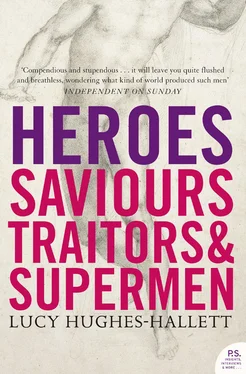In his youth he was the golden boy of Athens’ golden age. His family were rich, aristocratic (they claimed descent from Homer’s Nestor), and well connected not only in Athens but all over the Greek world. In constitutional terms every free male citizen of Athens was equal to every other, but in practice the nobility still dominated the government as they did the city’s economic and social life. Homer’s characters take it for granted that a person’s best qualities are inherited. ‘ No mean mencould sire sons like you’, Menelaus tells two handsome young strangers (he’s right – their fathers are both kings). Most of Alcibiades’ contemporaries would have made the same assumption. ‘ The splendourrunning in the blood has much weight,’ wrote Pindar. When Alcibiades was still a child his father was killed in battle and he was taken to live in the household of his guardian Pericles, who was for thirty years effective ruler of Athens. He could scarcely have been given a better start in life.
Nature was as kind to him as fortune had been. Like Achilles, he was dazzlingly beautiful. To Plutarch, writing five hundred years after his death, his loveliness was still so much of a byword that ‘ we need sayno more about it, than that it flowered at each season of his growth in turn’. In the homoerotic society of Athens such good looks made him an instant celebrity. As a boy, he was ‘ surrounded and pursuedby many admirers of high rank … captivated by the brilliance of his youthful beauty’. Whether he actually had sexual relations with any of them is unclear, but gossip maintained that he did. If so, few of his contemporaries would therefore have considered him either immoral or effete. Aeschylus, in the generation before Alcibiades, and Plato, his contemporary, both believed Achilles to be Patroclus’ lover (something Homer does not suggest), but neither of them thought any the less of him for it. On the contrary, Plato’s Phaedrus cites Achilles’ ‘ heroic choiceto go and rescue Patroclus’ as an example of the way in which love can ennoble a man, earning him ‘the extreme admiration of the gods’.
Among those smitten by Pericles’ ward was Socrates, who told a disciple that the two great lovesof his life were philosophy and Alcibiades. The philosopher had gathered around himself a group of aristocratic young men, non-paying students of whom Alcibiades was certainly not the most serious but of whom he was the most highly favoured. Plato (another of them) testifies that the relationship between the ugly middle-aged philosopher and the radiantly beautiful teenager remained chaste, but it surely was, at least on Socrates’ part, physically motivated. When in Plato’s Protagoras , which is set at a time when Alcibiades was about fifteen, Socrates claims to have become so engrossed in a philosophical discussion as to have briefly forgotten Alcibiades altogether, his friend teases him by saying ‘ Surely you did notfind anyone else of greater beauty there. No! not in all our city.’ Alcibiades’ beauty marked him out, just as Achilles’ had done, as a superior being. In the second century ad the Roman Emperor Hadrian, a connoisseur and devotee of male beauty as ardent as any Athenian, set up an image of Alcibiades in Parian marble and commanded that an ox should be sacrificed to him every year. In his lifetime as well, his looks made him an object, not only of lust, but also of worship. And lovely as he was, his charm was as potent as his physical attractions. His personal magnetism, according to Plutarch, ‘ was such thatno disposition could wholly resist it, and no character remain unaffected’. The events of his extraordinary career confirm the claim.
As a young man Alcibiades was showy, extravagant, outrageous. He wore his hair as long as a woman’s, spoke with a provocative lisp and strutted through the marketplace trailing his long purple robe. He was a ringleader, a setter of trends. Eupolis reports that he started a fashion for drinking in the morning. When he appeared in a new style of sandal all his contemporaries had copies made, and called them ‘Alcibiades’. He was proud and unbiddable, touchily conscious of his dignity as a nobleman. Plutarch relates an anecdote about him as a child playing in the street, first refusing to interrupt a game of dice in order to allow a cart to go by, and then lying down in the vehicle’s path to show his defiance of the driver’s threats, risking his life rather than take orders from a common carter. He refused to learn to play the flute, on the grounds that flautists made themselves look ridiculous by pursing their lips: flute-playing at once went out of fashion among the smart Athenian youth. As an adolescent, according to his son, he disliked the favourite Athenian sport of wrestling because ‘ some of the athleteswere of low birth’. As an adult, he was a keen breeder and trainer of horses, an amusement open only to the rich. He carried himself as one who knows himself to be a superior being, by virtue of his class but also because his gifts fitted him for a splendid destiny and because his gargantuan vitality would settle for no less. Plato records Socrates saying to him: ‘ You appear to mesuch that if any god were to say to you “Are you willing, Alcibiades, to live having what you now do, or would you choose to die instantly unless you were permitted greater things?” you would prefer to die.’ Socrates was not talking about material possessions. ‘Further, if the same god said “You can be master here in Europe, but will not be allowed to pass over into Asia”, it appears to me that you would not even on those terms be willing to live, unless you could fill the mouths of all men with your name and power.’ Like Achilles, Alcibiades, according to those intimate with him, had no use for an unremarkable life.
The device on his extravagantly splendid ivory and gold shield showed Eros with a thunderbolt, an image, combining aggressive sexuality with elemental violence, that nicely encapsulates the impression he made. He was prodigally, flashily generous. It was customary for wealthy Athenians with political ambitions to woo the populace by subsidizing choral performances and other public shows: Alcibiades’ were always the most lavish. His first public action was, characteristically, the donation of a quantity of money to the state, and it was performed with typically insouciant theatricality. He happened to be passing the place of assembly at a time when citizens had been asked to make voluntary contributions to the treasury to meet the costs of the war. He was carrying a live quail under his cloak, but hearing the applause with which donors were being received he went in, pledged a large sum, and at the same time inadvertently released the bird. There was laughter and a scramble that ended in a seaman named Antiochus catching the quail and handing it back to Alcibiades. The meeting was to prove a fateful one. Antiochus’ next appearance in recorded history is in the role of catalyst for Alcibiades’ downfall. For the time being, though, he was assisting at an auspicious occasion, the public debut of the rich young dilettante whose mind was on sport but who had demonstrated that he could, if it happened to please him, be of substantial service to the state.
While still in his teens Alcibiades served his stint in the army, as all Athenians were required to do, sharing a tent with Socrates. Philosopher and disciple each acquitted themselves well, but when Socrates saved the younger man’s life, fighting off the enemy when he lay wounded, it was Alcibiades who was awarded a crown and suit of armour as a prize for valour – an injustice that owes something to Socrates’ selflessness, something to the generals’ snobbery, and something as well to Alcibiades’ frequently noted gift for gaining the credit for more than he had actually performed. His actions were as ostentatious as his appearance. ‘ Love of distinctionand desire for fame’ were, according to Plutarch, the engines that drove him. But courageous he certainly was, and popular with both the common soldiers and those who commanded him.
Читать дальше












